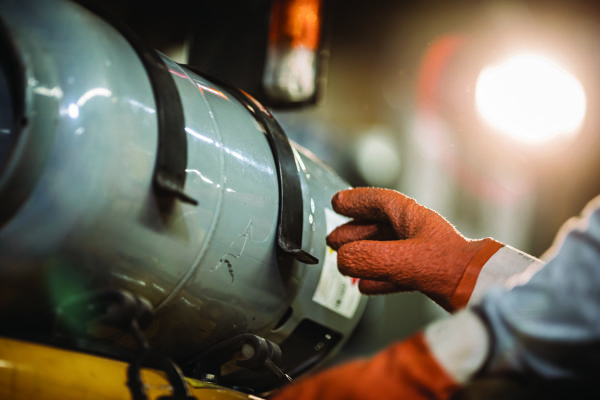Forklifts are one of the most commonly used pieces of equipment throughout the supply chain and distribution industry. The material handling equipment offers countless operational benefits, but it also introduces a variety of workplace hazards.
There are risks involved in operating any heavy industrial machine, including forklifts. The Occupational Safety and Health Administration (OSHA) conducted a study analyzing forklift-related accidents, injuries, and fatalities and found that the top six causes were operator inattention, forklift overturns, unstable loads, operators struck by a load, elevated employees, and lack of training.
 Fortunately, OSHA has several safety guidelines in place for warehouses concerning forklift operation, maintenance, and training. It’s important for forklift operators to stay up to date on training, not become complacent around heavy equipment, and remain proactive. Doing so will ensure the health and safety of employees and, ultimately, keep business running smoothly.
Fortunately, OSHA has several safety guidelines in place for warehouses concerning forklift operation, maintenance, and training. It’s important for forklift operators to stay up to date on training, not become complacent around heavy equipment, and remain proactive. Doing so will ensure the health and safety of employees and, ultimately, keep business running smoothly.
Here are a few of the most essential forklift safety tips. While some of these tips may seem obvious, it’s often the small, seemingly simple practices that get overlooked:
- Complete pre-operation inspection. Report any damages or problems to management, and don’t operate the forklift if it needs to be repaired.
- Buckle up before operating. With overturned forklifts being one of the leading causes of forklift-related incidents, it’s crucial to buckle up. In the event of an accident, wearing a seatbelt can save operators from getting crushed by the machine’s overhead guard or roll cage.
- Wear personal protective equipment like hard hats, protective footwear, and high-visibility clothing when working around forklifts and other heavy machinery.
- Don’t operate with a load that exceeds the lifting capacity. This will decrease the risk of tipping the machine.
- Watch your speed and sound the horn when visibility is blocked. Operators should maintain slow travel speeds and take corners and turns slowly to minimize the risk of tipping. They should also sound their horn if vision is obstructed to alert pedestrians or other operators and avoid unnecessary collisions.
- Maintain a safe distance from the edge of ramps to prevent tip-overs. When descending a ramp with a loaded forklift, operators should always travel in reverse with the forklift and payload pointed up the grade. When traveling up a ramp with an unloaded forklift, operators should always keep the forks pointed downgrade.
- Set the parking brake, lower the forks, and set the controls to neutral when finished operating. Safely parked equipment reduces the risk of unintended movement.
 While there are a variety of forklift fuels on the market, propane has proven to be a leader in the material handling market because of its many advantages. In fact, propane currently holds about 90 percent market share for Class 4 and 5 forklifts, according to data from the Propane Education & Research Council (PERC). And the majority of fleet managers prefer propane to diesel or electric, too — 70 percent from the 5,000 to 10,000 lbs. capacity range and 51 percent from the 10,000 and heavier capacities.
While there are a variety of forklift fuels on the market, propane has proven to be a leader in the material handling market because of its many advantages. In fact, propane currently holds about 90 percent market share for Class 4 and 5 forklifts, according to data from the Propane Education & Research Council (PERC). And the majority of fleet managers prefer propane to diesel or electric, too — 70 percent from the 5,000 to 10,000 lbs. capacity range and 51 percent from the 10,000 and heavier capacities.
Because propane is a widely-used forklift fuel, highlighting propane-specific safety tips is important for a variety of facilities across the United States. Here are a few safety reminders for employees operating propane-powered forklifts:
- Before operating, check cylinders for rusting, dents, gouges, and leaks. Cylinders that show signs of wear or leaks shouldn’t be used and may need to be replaced, even if within the cylinder’s requalification date.
- Secure the pressure relief valve on the cylinder. Operators should check that the pressure relief valve fitting is roughly 180 degrees from the forklift’s locating pin.
- When not in use, close the service valves on propane cylinders. This helps prevent potential injury around internal combustion engines and unintended fuel loss.
It’s also important to note that the propane industry has dedicated procedures to support businesses operating propane-powered equipment, including assistance from local propane suppliers across the country. And one way to enhance workplace safety is by developing a relationship with a local supplier.
Propane suppliers can serve as a great safety resource, providing support in a variety of ways. First of all, they work to ensure all employees understand how to properly and safely install propane cylinders on their forklifts. Beyond that, they can help crews identify the most convenient location for cylinder cages, so they don’t interfere with workflow — most often located away from exits, stairways, entryways, and high-traffic areas. They can also inspect cylinders each time they’re exchanged, remove damaged cylinders from service, and repair and replace worn valves and O-rings on cylinders as needed. Lastly, some propane suppliers offer additional safety training opportunities for their forklift customers.
For more information on forklift safety, visit Propane.com/SafetyFirst.
About the Author:
Jeremy Wishart is director of off-road business development for the Propane Education & Research Council. He can be reached at jeremy.wishart@propane.com.











